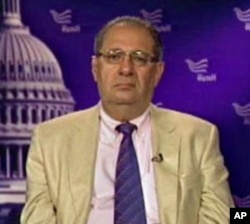This week’s attack on the U.S. and French embassies in Damascus was by no means the first, according to Ted Kattouf, President and CEO of the Washington-based nonprofit Amideast and former U.S. Ambassador to Syria (2001-2003). Back in 1998, during his predecessor Ryan Clark Crocker’s tenure as Ambassador in Damascus, something similar happened.
Watch related video:
“At that time,” Kattouf says, “there were U.N. sanctions on Iraq, and Saddam had done something to violate the sanctions, and we launched a short-term operation in Iraq.” Anti-U.S. mobs or “rent-a-thugs” as Kattouf quips, were unleashed against the U.S. mission.
“Ambassador Crocker and his wife had to take cover in a safe room upstairs, while protest mobs ransacked the lower level of their residence,” he said.
This week’s attack on the American and French embassies were triggered by the visit of U.S. Ambassador Robert Ford and French Ambassador Eric Chevallier to Hama Thursday and Friday in what has been billed as a show of solidarity with protesters, who have been targeted by government and security forces.
The attackers damaged not just buildings, but the relationship between the U.S. and Syria which, while hardly warm, has been at least accommodating in recent years.
Syria reacted angrily to Ford’s visit to Hama, accusing the U.S. of meddling in its affairs.
U.S. Secretary of State Hillary Clinton declared Monday that the Syrian president had lost all legitimacy to remain in power. "President Assad is not indispensable and we have absolutely nothing invested in him ... remaining in power," she said.
In an interview with the American CBS television network on Tuesday, President Obama echoed Clinton’s comments, saying al-Assad was “losing legitimacy in the eyes of his people,” and had missed “opportunity after opportunity” for instituting genuine reform.
Rebukes, yes, say many analysts, but they were tame, stopping well short of calling for Assad to step down.
Rights groups estimate that since the beginning of the Syrian uprising, more than 1,400 people have been killed, mostly protesters, and more than 10,000 people remain in jail or missing altogether.
Washington was comparatively quick to intervene in Egypt and Libya - what are its options now in Syria? Some observers are urging Washington to call on Assad to step down. Others believe the Syrian president should be referred to the International Criminal Court, like Libya’s Moammar Gadhafi, and indicted for crimes against humanity.
Kattouf believes Washington has several good reasons for not responding more harshly to the Syrian crackdown, "Washington does not want to take ownership of the Syrian revolution."
“We have our hands full elsewhere, thank you,” said Kattouf. "And oh, by the way, the Syrian people haven’t asked the U.S. to intervene.”
However, in Kattouf’s opinion, Washington worries about who would step in if Bashar al-Assad were to fall. Some analysts hint that the current unrest in Syria is driven by Sunni “terrorists” and suggest that if they were to come to power, Syrians would be no better off than they were under 30 years of Assad regimes. Further, the politics of Syria are so wrapped in Middle East politics that the removal of Assad could lead to a general destabilization of the entire region.
State Department spokeswoman Victoria Nuland said this week that Syria has cooperated in mopping up the damage done to the U.S. embassy and Ambassador’s residence. "We have been able, working with the Syrians, to upgrade security, get some of the repairs made that needed to be made, particularly with regard to windows and cameras and those things," Nuland told reporters, adding that Syria's Foreign Ministry returned the American flag that had been stolen from the U.S. Embassy and replaced by a Syrian flag.
Nuland also said that Syrian police have arrested six protesters who took part in the attack. “Our number one priority is to restore the security and operational effectiveness of our embassy and to see the Government of Syria meet its Vienna Convention obligations,” said the spokeswoman.
As for Ambassador Ford, whose visit to Hama triggered the attack on the embassy, he says he will continue to travel the country to meet and greet Syrians. Meanwhile, Syrian forces continue to target protesters across the country.
Former Ambassador Kattouf does not believe that change will come to Syria any time soon. He points out that Al-Assad has been promising reform ever since he succeeded his father as president 11 years ago. “You have to ask yourself,” said Kattouf. “Why have they been shooting so many people in the streets if they’re willing to reform?”







